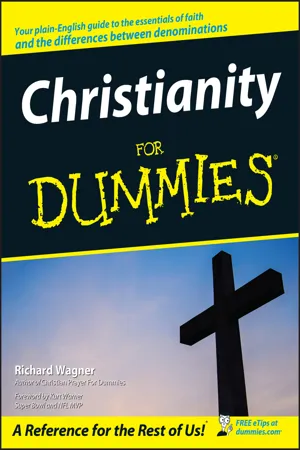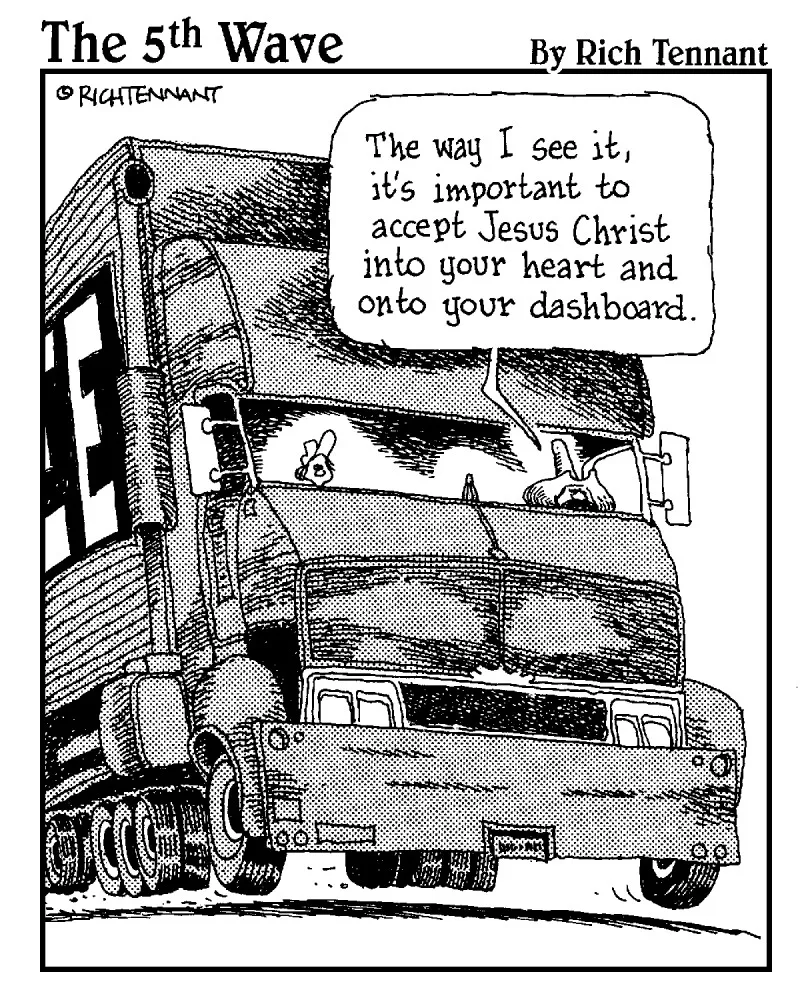
- English
- ePUB (mobile friendly)
- Available on iOS & Android
eBook - ePub
Christianity For Dummies
About this book
Get to know the beliefs and practices inspired by Jesus Christ Discover what it means to be a Christian and follow the gospel Curious about Christianity? This friendly guide helps you understand the basic teachings of the Christian faith, exploring the common ground that all Christians share, the differences among the major branches, the key events in Christian history, the key theological issues, and the many ways Christians live out their faith in today's world.
The Dummies Way
- Explanations in plain English
- "Get in, get out" information
- Icons and other navigational aids
- Tear-out cheat sheet
- Top ten lists
- A dash of humor and fun
Discover how to:
- Express the core essentials of Christianity
- Appreciate the life and teachings of Jesus
- Understand why the Bible is central to the faith
- Respect the unique roles of the Trinity
- Explore controversial issues among the branches
Tools to learn more effectively

Saving Books

Keyword Search

Annotating Text

Listen to it instead
Information
Part I
Uncovering What Christianity’s All About

In this part . . .
**IN a DROPCAP**
If you’ve ever left your car out in ice or snow, you know that before driving, you first have to scrape off the windshield to have a clear view of the road. This first part helps act as that ice scraper by creating a clear picture of what Christianity is and showing you how the Christian faith compares to other world religions. Here I give you a backdrop on what Christianity claims as truth, so you can delve into the details that I discuss later in this book and understand why Christians do what they do. In that light, this section explores how Christians answer questions about the existence of God and the reliability of the Bible. I also introduce you to that which is responsible for Christianity’s existence: the message of God’s grace.
Chapter 1
Good News in a Bad News World
In This Chapter





When you click the remote and watch the nightly news broadcast, good news is sure hard to come by. Instead, other people’s bad news always seems to take center stage: A burglar steals an elderly couple’s life savings, a fire rips through an apartment building, or a hijacked plane crashes in Siberia. You visit the checkout aisle at your local grocery and see that other people’s bad news sells tabloids: a celebrity’s failed two-week-old marriage, a politician’s scandal, or a mystery illness that causes an Olympic gold medalist to grow a second nose.
You and I are inundated with bad news, but it’s the yearning for good news that keeps us getting out of bed each day: a marriage proposal, a job promotion, the expectancy of a child or grandchild, the winning ticket of the Super Lotto. Good news not only makes your day, but it also gives you hope and optimism for the future.
Christianity is a faith that’s all about good news. The heart of the Christian message is called the gospel, which means — you guessed it — the “good news.” The Christian faith, therefore, claims to offer meaning and hope to people, not just for a day, but also for all eternity.
So what exactly is this so-called good news that Christianity claims? How is it different from other religions? And if Christianity is supposed to be about good news, why does it seem that so much bad news — scandalous priests, corrupt televangelists, and so on — flows from the Christian Church these days?
In this chapter, you discover the essence of Christianity and how it compares to other world religions. You also explore some popular misconceptions of the Christian faith so that you can discern what Christianity is and is not.
Packing Christianity into a Nutshell
Trying to define Christianity in a single sentence is kind of like trying to cram my family’s luggage into the back of our minivan when we go on vacation — an impossible task until you start throwing many bags, even seemingly important ones, out the window. I spend this entire book diving into what the Christian faith is, but if I had to pack it into a nutshell, I’d say that Christianity is the belief that God chose to create and love humans, and — at an incredible cost to himself — frees them from a tight spot if only they, in response, choose to reach out for his helping hand.
I dive into the cut-and-dry basics of Christianity later in this chapter, but first I give you the scoop on the whole shebang — from beginning to end (as briefly as possible!) so you know what you’re dealing with. So kick back, get a mug of java or tea, and read on for the story of Christianity. (If you want to get to the nitty-gritty, flip ahead to the section, “Understanding how Christians define their faith.”)
Going back to the beginning: People choosing, God responding
Christians believe in what they call the one True God, who is perfect, has existed forever, and created the world and all its itty-bitty little creatures (see Chapter 7). But when God created humans, he came up with something extra special; he not only gave people pinky toes and eyebrows, but also the one-of-a-kind gift of free will (choice).
God gave people the ability to choose whether to follow him and have a relationship with him or to go our own separate ways. The reason he did this seems pretty obvious to me: Suppose you desired a relationship with a special someone. Would you prefer a person who decidedly picked you out of a crowd, or would you rather have a robot that was programmed to do nothing else? Personally, I prefer the chooser. I often wonder why my wife decided on me, but I won’t argue; I’ll just enjoy the voluntary, albeit semi-crazy, decision she made. So too, God opted for a humanity with free choice. But when he did so, he took a risk, because people can decide to go their own ways and forget about him.
-plgo-compressed.webp)
The first folks to live out this experiment in freedom were Adam and Eve. The couple had some good times with God for a while. But as the Bible talks about in the Book of Genesis, curiosity got the better of them, and they soon wanted to know what it was like doing what they wanted to do instead of what God wanted them to do. They disobeyed God, setting off a chain reaction of disobedience (or sin ) that has spiraled through every generation since them. See Chapter 4 for more on Adam and Eve’s escapade.
When people recognize sin in their lives, their natural response is to try to do something to make up for it. Humans have continually tried to earn God’s favor by doing good deeds as a payback (see Chapter 15). Christianity says that payback with God is impossible, though. Think of it like this: Suppose a genie grants you a wish to be transformed into a fish if you want to. Because he asks you in the middle of a heat wave, the idea of being a fish surrounded 2 4/7 by chilly water sounds really cool, so you take the plunge into the deep blue sea. However, after a long swim and an initial fling with a puffer fish, you decide that the fish’s life isn’t for you. Your natural response may be to swim upstream to where you initially jumped into the water and hope that somehow that action will reverse the metamorphic process. But no amount of swimming against the current will change you back into a human again. Instead, the genie, by his own initiative, has to change you back.

Table of contents
- Title
- Contents
- Introduction
- Part I : Uncovering What Christianity’s All About
- Chapter 1: Good News in a Bad News World
- Chapter 2: Christianity: But Is It True?
- Chapter 3: That Amazing Stuff Called Grace
- Part II : Exploring the Basic Principles of the Christian Faith
- Chapter 4: Sin: Why “Do’s and Don’ts” Miss the Bigger Picture
- Chapter 5: Jesus Christ: His Life, Ministry, and Radical Claims
- Chapter 6: Peeking Inside God’s Diary: The Bible
- Chapter 7: The Trinity: How 1+1+1 Equals 1
- Chapter 8: The Rite Stuff: Sacraments, Ordinances, and the Christian Faith
- Chapter 9: Heading for Home: The End Game
- Part III : Here’s the Church, Here’s the Steeple: Peeking into the Christian Church
- Chapter 10: Tradition, Tradition: The Catholic and Orthodox Churches
- Chapter 11: Back to the Basics: The Protestant Church
- Chapter 12: Making Sense of Worship
- Part IV : Christian Living in a Postmodern World
- Chapter 13: I’m a Christian — Now What?
- Chapter 14: Being in the World but Not of It
- Chapter 15: Tackling Thorny Issues in the Church
- Chapter 16: Taking On Tough Issues Raised in the Real World
- Part V : The Part of Tens
- Chapter 17: Ten Christian Holy Days, Holidays, and Seasons
- Chapter 18: Ten Christian Leaders You Should Know About
- Chapter 19: Ten New Testament Teachings You Should Know About
- : Appendix A
- : Appendix B
Frequently asked questions
Yes, you can cancel anytime from the Subscription tab in your account settings on the Perlego website. Your subscription will stay active until the end of your current billing period. Learn how to cancel your subscription
No, books cannot be downloaded as external files, such as PDFs, for use outside of Perlego. However, you can download books within the Perlego app for offline reading on mobile or tablet. Learn how to download books offline
Perlego offers two plans: Essential and Complete
- Essential is ideal for learners and professionals who enjoy exploring a wide range of subjects. Access the Essential Library with 800,000+ trusted titles and best-sellers across business, personal growth, and the humanities. Includes unlimited reading time and Standard Read Aloud voice.
- Complete: Perfect for advanced learners and researchers needing full, unrestricted access. Unlock 1.4M+ books across hundreds of subjects, including academic and specialized titles. The Complete Plan also includes advanced features like Premium Read Aloud and Research Assistant.
We are an online textbook subscription service, where you can get access to an entire online library for less than the price of a single book per month. With over 1 million books across 990+ topics, we’ve got you covered! Learn about our mission
Look out for the read-aloud symbol on your next book to see if you can listen to it. The read-aloud tool reads text aloud for you, highlighting the text as it is being read. You can pause it, speed it up and slow it down. Learn more about Read Aloud
Yes! You can use the Perlego app on both iOS and Android devices to read anytime, anywhere — even offline. Perfect for commutes or when you’re on the go.
Please note we cannot support devices running on iOS 13 and Android 7 or earlier. Learn more about using the app
Please note we cannot support devices running on iOS 13 and Android 7 or earlier. Learn more about using the app
Yes, you can access Christianity For Dummies by Richard Wagner in PDF and/or ePUB format, as well as other popular books in Theologie & Religion & Kirchengeschichte. We have over one million books available in our catalogue for you to explore.